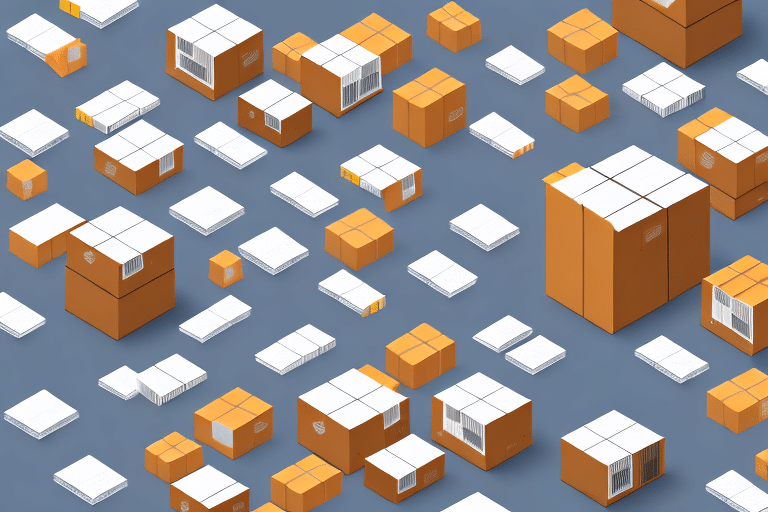What Is B2B Fulfillment Ecommerce 3PL With B2B Fulfillment Capabilities, Retail Fulfillment, and Wholesale Distribution?
In today's fast-paced business world, companies need efficient and reliable solutions to meet their logistical demands. B2B fulfillment ecommerce 3PL with B2B fulfillment capabilities, retail fulfillment, and wholesale distribution is one such solution that can help businesses effectively manage their supply chain and order fulfillment needs. Let's take a closer look at what this solution entails and why it's essential for modern businesses.
Understanding the Basics of B2B Fulfillment Ecommerce 3PL
B2B fulfillment ecommerce 3PL refers to third-party logistics providers that specialize in handling the supply chain and order fulfillment needs of B2B ecommerce businesses. These providers offer a range of services, including warehousing, inventory management, order processing, and shipping. By outsourcing these tasks to 3PL providers, businesses can focus on their core competencies and meet their customers' demands more efficiently.
One of the key benefits of using a B2B fulfillment ecommerce 3PL provider is the ability to scale operations quickly. As a business grows, it may become difficult to manage the logistics of order fulfillment in-house. By partnering with a 3PL provider, businesses can easily expand their operations without worrying about the logistics of managing additional inventory and shipping orders.
Another advantage of using a B2B fulfillment ecommerce 3PL provider is the ability to offer faster shipping times to customers. 3PL providers often have multiple warehouses strategically located across the country, allowing for faster delivery times and reduced shipping costs. According to a 2023 report by Statista, the average fulfillment time has decreased by 15% with the adoption of 3PL services, providing a major competitive advantage for businesses looking to stand out in a crowded ecommerce market.
The Advantages of B2B Fulfillment Capabilities for Ecommerce Businesses
One of the major advantages of B2B fulfillment capabilities is that it helps businesses streamline their operations and improve their order fulfillment speed and accuracy. By outsourcing logistics tasks to experienced providers, businesses can reduce errors and delays that can hinder customer satisfaction and lead to lost sales. Additionally, B2B fulfillment providers can help businesses scale their operations and adapt to changing market demands without incurring significant costs.
Another advantage of B2B fulfillment capabilities is that it allows businesses to focus on their core competencies. By outsourcing logistics tasks, businesses can free up their time and resources to focus on product development, marketing, and other areas that are critical to their success. This can help businesses stay competitive in a crowded marketplace and differentiate themselves from their competitors.
The Role of 3PL in B2B Fulfillment and Distribution
Third-party logistics providers play a crucial role in B2B fulfillment and distribution by handling essential tasks such as warehousing, inventory management, and shipping. 3PL providers can also provide advanced analytics that enable companies to optimize their logistics operations further. They offer a wide range of services, from basic storage and transportation to more complex supply chain management solutions, such as freight forwarding, cross-docking, and customs brokerage.
One of the key benefits of using a 3PL provider is the ability to scale operations quickly. As a business grows, it may not have the resources or expertise to handle increased demand for its products. A 3PL provider can step in and provide the necessary infrastructure and support to ensure that orders are fulfilled on time and to the customer's satisfaction. This can be especially important during peak seasons or when unexpected spikes in demand occur.
Another advantage of working with a 3PL provider is the ability to access new markets. Many 3PL providers have a global network of warehouses and distribution centers, which can help businesses expand their reach and enter new markets. According to a 2023 report by the Forbes Technology Council, businesses that utilize 3PL services can enter foreign markets up to 30% faster than those managing logistics in-house.
How Retail Fulfillment Works in a B2B Context
When it comes to retail fulfillment, B2B ecommerce businesses must adapt their strategies to meet the expectations of their customers. Retail fulfillment requires getting orders to the end customer rapidly, accurately, and cost-effectively. In a B2B context, this can involve collaborating with online marketplace providers such as Amazon to reach a broader audience and maximize sales. The key is to ensure that retail orders are fulfilled promptly while keeping costs under control.
One way to achieve efficient retail fulfillment in a B2B context is to implement a warehouse management system (WMS). A WMS can help businesses optimize their inventory management, reduce errors, and improve order accuracy. By automating processes such as picking, packing, and shipping, a WMS can also increase productivity and reduce labor costs. According to a 2023 survey by Logistics Management, businesses using WMS have seen a 20% increase in order accuracy.
Another important aspect of retail fulfillment in a B2B context is customer service. B2B customers often have specific requirements and expectations when it comes to order fulfillment, such as customized packaging or delivery schedules. To meet these demands, businesses need to have a responsive and knowledgeable customer service team that can provide timely and accurate information to customers. By prioritizing customer service, B2B ecommerce businesses can build strong relationships with their customers and differentiate themselves from competitors.
Wholesale Distribution Explained: What It Is and Why It Matters
Wholesale distribution is the process of selling goods in bulk to retailers or other wholesalers. Many B2B ecommerce businesses require a robust wholesale distribution network to effectively serve their customers and reach new markets. Wholesale distribution typically involves managing a large inventory of products and coordinating logistics and transportation effectively. By using a B2B fulfillment ecommerce 3PL provider with wholesale distribution capabilities, businesses can streamline their operations and enhance their supply chain management capabilities.
One of the key benefits of wholesale distribution is the ability to offer competitive pricing to retailers and other businesses. By purchasing goods in bulk, wholesalers can negotiate lower prices from manufacturers and suppliers, which they can then pass on to their customers. This can help retailers to increase their profit margins and remain competitive in their respective markets. Additionally, wholesale distribution can help businesses to expand their reach and enter new markets, as wholesalers often have established relationships with retailers and other businesses in different regions or industries.
The Importance of Efficient Logistics in B2B Fulfillment Ecommerce
Efficient logistics is critical in B2B fulfillment ecommerce as it can directly impact a business's ability to meet customer expectations and remain competitive in the marketplace. By partnering with an experienced 3PL provider, businesses can optimize their logistics operations and reduce fulfillment times, which can ultimately lead to higher customer satisfaction rates and repeat business. Efficient logistics can also help companies reduce their storage and transportation costs and improve their overall supply chain management capabilities.
One of the key benefits of efficient logistics in B2B fulfillment ecommerce is the ability to handle large volumes of orders quickly and accurately. This is particularly important during peak seasons or when unexpected spikes in demand occur. With streamlined logistics processes, businesses can ensure that they have the necessary inventory on hand to fulfill orders in a timely manner, without sacrificing quality or accuracy.
In addition, efficient logistics can also help businesses expand their reach and enter new markets. By optimizing their supply chain and logistics operations, companies can reduce the time and cost associated with shipping products to new locations. This can help businesses tap into new customer bases and increase their revenue streams, while also improving their overall brand reputation and customer loyalty.
Tips for Choosing the Right 3PL Partner for Your B2B Business
Choosing the right 3PL partner is essential for any B2B business looking to optimize its fulfillment and distribution operations. Businesses should look for a provider that offers a broad range of services, including warehousing and order fulfillment, and can seamlessly integrate with their existing systems. Other key factors to consider when choosing a 3PL partner include their experience with B2B ecommerce, their track record of reliability and accountability, and their commitment to customer service.
Another important factor to consider when choosing a 3PL partner is their ability to scale with your business. As your business grows, your fulfillment and distribution needs will also increase. It's important to choose a partner that can accommodate your growth and provide flexible solutions to meet your changing needs.
Additionally, businesses should consider the location of their 3PL partner's facilities. Choosing a partner with strategically located warehouses can help reduce shipping costs and transit times, ultimately improving the customer experience. It's also important to ensure that the partner's facilities meet any necessary regulatory requirements for your industry.
The Future of B2B Fulfillment Ecommerce: Trends to Watch Out For
The B2B fulfillment ecommerce landscape is constantly evolving, and businesses need to stay on top of the latest trends to remain competitive. Some of the trends to watch out for in the coming years include the increasing use of machine learning and artificial intelligence in supply chain management, the rise of omnichannel fulfillment solutions, and the growing importance of sustainability. By staying ahead of these trends and partnering with an innovative 3PL provider, businesses can prepare themselves for future success.
One of the key drivers of change in the B2B fulfillment ecommerce landscape is the increasing demand for faster and more efficient delivery options. This has led to the rise of same-day and next-day delivery services, as well as the use of drones and autonomous vehicles for last-mile delivery. In addition, businesses are exploring new ways to optimize their supply chains, such as using blockchain technology to improve transparency and reduce fraud. According to a 2023 report by McKinsey & Company, implementing blockchain in supply chains can increase transparency by up to 50%, thereby reducing fraud and errors.
By embracing these new technologies and delivery methods, businesses can meet the evolving needs of their customers and gain a competitive edge in the marketplace.
Challenges and Solutions for Scaling Your B2B Fulfillment Operations
Scaling your B2B fulfillment operations can be a significant challenge, particularly for fast-growing businesses. Some of the key challenges include managing expanding inventories, coordinating logistics and transportation, and ensuring consistent product quality. The right 3PL partner can help businesses overcome these challenges by providing advanced inventory management systems, streamlined logistics and transportation solutions, and rigorous quality control and assurance measures.
Best Practices for Managing Inventory in B2B Fulfillment Ecommerce
Efficient inventory management is essential for any B2B ecommerce business looking to optimize operations and remain competitive. Businesses should prioritize inventory accuracy, establish appropriate inventory levels, and track inventory levels in real-time. By partnering with a 3PL provider with advanced inventory management capabilities, businesses can streamline inventory management and reduce errors and delays that can hinder customer satisfaction and lead to lost sales.
How to Streamline Your Order Processing with B2B Fulfillment Capabilities
Streamlining order processing is essential for B2B ecommerce businesses looking to meet customer demands efficiently. By using B2B fulfillment capabilities, businesses can improve order processing speed and accuracy, streamline shipping and logistics, and reduce the time to deliver products to customers. Other key strategies for optimizing order processing include:
- Investing in automated processing systems
- Developing clear and concise order fulfillment workflows
- Providing customers with real-time tracking and delivery updates
Overall, B2B fulfillment ecommerce 3PL with B2B fulfillment capabilities, retail fulfillment, and wholesale distribution is an essential solution for modern businesses looking to streamline their operations, improve supply chain management, and meet the growing demands of their customers. By partnering with an experienced 3PL provider and leveraging the latest technology and best practices, businesses can stay ahead of the competition and achieve long-term success in today's ever-changing marketplace.






















